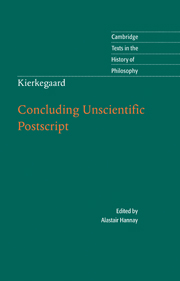Book contents
- Frontmatter
- Contents
- Introduction
- Chronology
- Further reading
- Note on the translation
- CONCLUDING UNSCIENTIFIC POSTSCRIPT TO THE PHILOSOPHICAL CRUMBS
- Preface
- Contents
- Introduction
- Part One The objective problem of Christianity's truth
- Part Two The subjective problem. The subject's relation to the truth of Christianity, or what it is to become a Christian
- 1 An expression of gratitude to Lessing
- 2 Possible and actual theses of Lessing
- 1 Becoming subjective
- 2 The subjective truth, inwardness; truth is subjectivity
- 3 Actual, ethical subjectivity; the subjective thinker
- 4 The problem of the Crumbs: how can an eternal happiness be built on historical knowledge?
- 5 Conclusion
- Appendix: Understanding with the reader
- A first and last declaration by S. Kierkegaard
- Index
- Cambridge Texts in the History of Philosophy
1 - An expression of gratitude to Lessing
Published online by Cambridge University Press: 26 February 2010
- Frontmatter
- Contents
- Introduction
- Chronology
- Further reading
- Note on the translation
- CONCLUDING UNSCIENTIFIC POSTSCRIPT TO THE PHILOSOPHICAL CRUMBS
- Preface
- Contents
- Introduction
- Part One The objective problem of Christianity's truth
- Part Two The subjective problem. The subject's relation to the truth of Christianity, or what it is to become a Christian
- 1 An expression of gratitude to Lessing
- 2 Possible and actual theses of Lessing
- 1 Becoming subjective
- 2 The subjective truth, inwardness; truth is subjectivity
- 3 Actual, ethical subjectivity; the subjective thinker
- 4 The problem of the Crumbs: how can an eternal happiness be built on historical knowledge?
- 5 Conclusion
- Appendix: Understanding with the reader
- A first and last declaration by S. Kierkegaard
- Index
- Cambridge Texts in the History of Philosophy
Summary
If a wretched amateur thinker, a speculative crank who, like a poor lodger, occupied an attic at the top of a vast building, sat there in his little closet, absorbed in what seemed to him difficult thoughts; if he began to conceive a dim suspicion that somewhere or other there must be something wrong with the foundations, without finding out more specifically how; if, whenever he looked out of his garret window, he shuddered as he saw the redoubled and hurried efforts to beautify or expand the building, so that after having seen and shuddered he subsided, drained of energy, uncomfortable as a spider who in its narrow nook sustains a miserable existence since the last house-cleaning, all the while anxiously sensing a storm in the air; if, whenever he expressed his doubts to someone, he perceived that his speech, because of its departure from the usual manner of dressing up a thought, was regarded as the worn-out and bizarre costume of some unfortunate derelict – if, I say, such an amateur thinker and speculative crank were suddenly to make the acquaintance of a man whose celebrity did not directly ensure for him the validity of his thoughts (for the poor lodger was not quite so objective as to be able with no more ado to draw the conclusion backwards from renown to truth)
- Type
- Chapter
- Information
- Kierkegaard: Concluding Unscientific Postscript , pp. 53 - 60Publisher: Cambridge University PressPrint publication year: 2009

